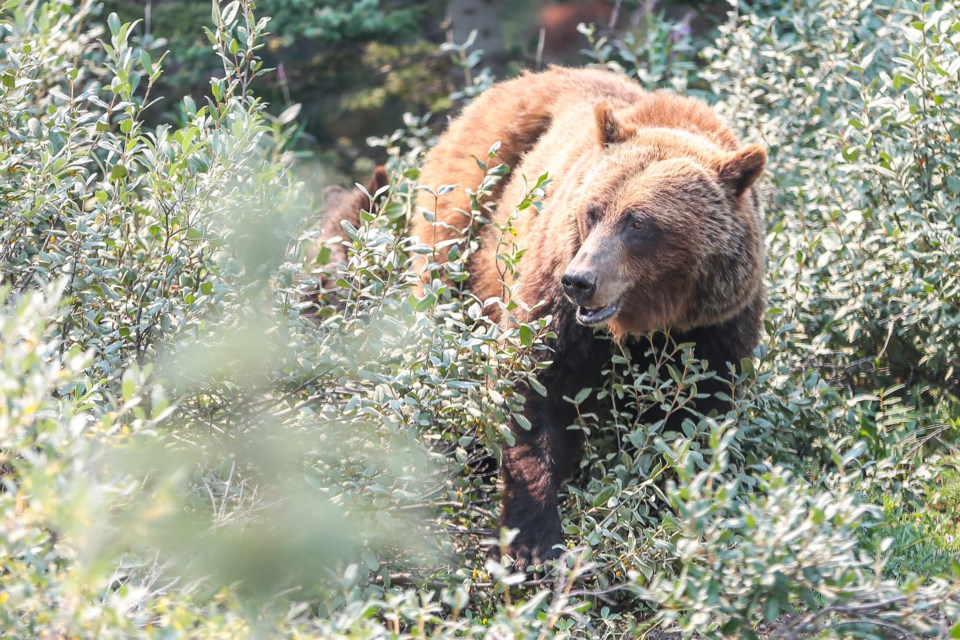YOHO NATIONAL PARK, Alta — A female grizzly bear has been struck and killed on the Trans-Canada Highway in Yoho National Park.
The five-year-old grizzly – whose mother was grizzly bear No. 156 and was also killed on the highway in the B.C. national park in May last year – was struck in the early hours of Tuesday (June 7). She is the sibling of the well-known white bear.
“This is another disappointing loss because it is a female that’s at reproductive age,” said David Laskin, wildlife ecologist for Lake Louise, Yoho and Kootenay field unit.
Wildlife experts believe the five-year-old grizzly climbed over the seven-foot wildlife exclusion fence.
Laskin said the bear has been feasting on early spring vegetation by the side of the highway, such as grass and dandelions, but may also have been trying to avoid a large male bear in the area.
“This bear was capable of climbing the highway fences, and this is not generally in the skill set of grizzly bears,” said Laskin.
“It is generally an issue that we have with black bears – they’re much better climbers than grizzlies – but this bear also has the same ability and that put it at higher risk.”
Laskin said there is also a chance the brown-coloured grizzly bear had climbed to escape a large male bear that had been seen in the area.
“It’s breeding season for bears so that may have exacerbated this,” he said.
“Particularly because she could climb the fence, she could have thought the other side of the fence was a kind of refuge or to take a break from the pursuit.”
This is the second grizzly bear to be killed this spring in Banff, Yoho or Kootenay national parks.
A large male grizzly bear was struck by a train on the Canadian Pacific Railway about eight kilometres west of Lake Louise in Banff National Park on May 12.
“We’d only seen it a couple of times before, maybe a backcountry bear coming in,” said Laskin.
“It was just probably wasn’t used to the train like some of our veteran bears.”
Following the death of the female grizzly bear on Tuesday, Parks Canada took several immediate actions including reducing the 90-km/h speed limit to 70km/h between West Louise Lodge and the bottom of the Field hill.
Laskin said speed enforcement will be heightened in the reduced speed zone, adding visitors are reminded that speeds of more than 30 km/h above the posted limit in Yoho National Park can result in a vehicle being impounded.
“A no-stopping zone along the same stretch of highway is currently being established and roadside vegetation will be managed to make this area less attractive for bears as a food source,” he said.
More broadly, Parks has been conducting a study to examine reducing wildlife mortality through the strategic use of speed limit reductions and signage.
“That’s been underway for about a year,” said Laskin.
Parks Canada wildlife crews have been working hard to keep this bear and others in the area safe and away from the road, including hazing.
“It is really disappointing. We manage these bears closely; we respond quickly to all bear activity along the Trans-Canada Highway,” said Laskin.
“We spend countless hours working hard to prevent them from being habituated and being on the road,” he added.
“Not every area along the Trans-Canada in Yoho is fenced, so we were working really hard to keep them to safe and when things like this happen, it definitely affects us all.”
Even though there are wildlife exclusion fences in much of Banff and part of Yoho, drivers should still expect to encounter wildlife and stick to posted speed limits.
The late arrival of spring and the above-average snowpack at higher elevations is keeping bears in the valley bottoms in search of food.
“Bears come to the valley bottom to find food because it’s the first place to green up… the vegetation is the attraction along the ditches,” said Laskin.
“The bears are spending more time in the valley bottom, longer than they typically would, and this extends the time that these bears are spending roadside, which leads to habituation.”
Laskin reminds visitors of the importance of not stopping when they see wildlife by the side of the road.
“If they see wildlife, slow down and then carry on,” he said.
Grizzly bears are listed as threatened in Alberta and ranked as S3 (Vulnerable Uncertain) in B.C.
Parks Canada asks that any bear sightings be reported to Banff National Park dispatch at 403-762-1470.



